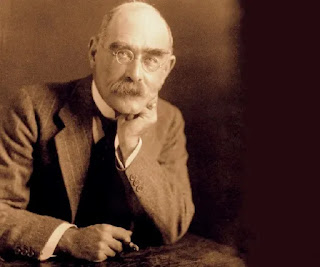Between the Jungle and the Crown: Rudyard Kipling's Literary Odyssey
Rudyard Kipling, a luminary of English literature, was born on December 30, 1865, in Bombay, India, during British rule. Raised in India's lush and culturally rich landscape, his early childhood was filled with the sights and sounds of the subcontinent, which would profoundly influence his writing. However, at the age of five, he was sent to England for schooling, where he faced a harsh and lonely time at the hands of his foster family. He later attended the United Services College in Westward Ho!, Devon, a more positive period that nurtured his burgeoning literary talent.
Kipling's vast and varied work reflects a life spent between India, England, and later America. His most significant and best-known works often draw upon his experiences in India, including the Jungle Book series (1894-1895), a collection of stories featuring Mowgli, a boy raised by wolves in the Indian jungle, and "Kim" (1901), a novel depicting the complex and vibrant tapestry of Indian culture through the eyes of a young boy. These works are celebrated for their imaginative storytelling and vivid characterizations of life in the British Empire.
Another significant contribution is his poetry, including "If—" (1895) and "Gunga Din" (1890), which have entered the lexicon as examples of Victorian and Edwardian stoicism and imperialist sentiments. His poem "If—" remains particularly influential, often cited for its themes of resilience and stoicism.
Kipling's impact on literature and world society is substantial. He was awarded the Nobel Prize in Literature in 1907. He was the first English-language writer to receive the honor, recognized for his ability to capture the essence of the British imperial experience. However, his portrayal of colonialism and racial attitudes has also sparked considerable debate and reevaluation. His works continue to be studied for their complex interplay of imperialism, cultural encounters, and narrative innovation.
Today, Kipling is remembered in various shades. While his storytelling genius and contribution to children's literature are celebrated, his ideological leanings and portrayal of colonialism are critically examined. Institutions, streets, and awards named after him persist, signifying his enduring legacy, yet they are often accompanied by discussions about the imperialist underpinnings of his work. Much like his literature, his legacy presents a paradox—simultaneously revered for his literary brilliance and scrutinized for his outdated views on race and empire. Ultimately, Kipling remains a figure of immense talent and controversy whose works continue to provoke, charm, and unsettle readers worldwide.



Comments
Post a Comment